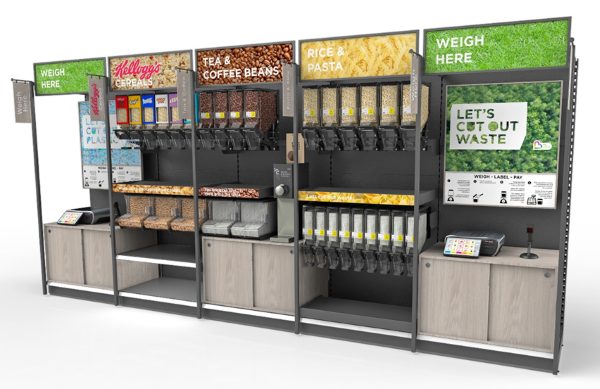Asda is set to continue its drive to reduce the use of plastic in its business by testing a refill scheme for its own food products and those of leading brands.
From May, its store in Middleton, Leeds, will become the first Asda in the UK where shoppers can fill up their own containers with a range of products. These will include Asda’s own label coffee, rice and pasta, as well as Kellogg’s cereals such as Coco Pops and Rice Krispies and Unilever’s PG Tips tea.

In addition to the refill stations, the store will include a ‘naked florist’ offering plastic-free flowers and loose produce with items such as cucumbers and mushrooms being taken out of their plastic packaging. There will also be a range of new recycling facilities, including a reverse vending machine for plastic bottles, and cans and hanger recycling.
People shopping at the store will be asked to give their feedback on different trials – allowing Asda and its suppliers to understand more about how the new ideas work in practice. Trials will last for at least three months before a decision is made on whether to roll out, retrial or stop.
At the end of last year, Asda brought forward commitments to make almost a third of the plastic packaging on its own label products from recycled sources by the end of 2020 and reduce its plastic use by 15% by February 2021. It also launched an initiative to encourage suppliers to find new packaging solutions to curtail plastic waste.
Asda’s Chief Executive, Roger Burnley said today: “We’re on an ongoing quest to remove and reduce the amount of plastic in our business – and to find new ways to help our customers to reuse and refill our products. It’s a journey we can’t go on alone, which is why we invited our suppliers to innovate with us and I’m delighted that household names like Kellogg’s and Unilever have joined us in testing new ideas and approaches to sustainability at our Middleton store.
“Over the coming weeks and months, we will be testing and learning from the customers in Middleton to understand how we can reduce our environmental impacts whilst still maintaining the great service and quality our customers demand.”
Other supermarkets are also testing product refill options. Waitrose began testing its ‘Unpacked’ concept at its Oxford store in June last year. Around 200 products were taken out of their packaging to assess how customers might be prepared to shop differently.
Sainsbury’s stepped up its efforts to tackle packaging waste last year by pledging to halve the amount of plastic used in its stores by 2025, across both branded and own label. To meet its new goal, the chain has launched a programme aimed at accelerating change, which includes switching to alternative materials, using lighter-weight plastics and introducing refillable packaging.
Meanwhile, Tesco has also been stepping up its fight against plastic waste with it recently warning that brands using excessive or hard to recycle packaging face being delisted.
NAM Implications:
- Alternative materials and lower content plastic can provide a retailer-controllable means of reducing plastic.
- Refilling carries the risk of contamination, possibly resulting in costly litigation…
- Still worth trialling the concept.




